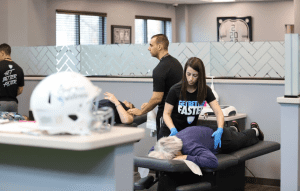A pinched nerve develops when there is too much pressure exerted on a nerve by cartilage, bones, tendons and muscles. This pressure affects the functioning of the nerve and causes weakness, numbing, tingling and pain.
A pinched nerve can be found in different parts of the body. For example, a nerve root may be pressed down by a bulging or herniated disc. This usually causes pain that spreads to the back of the leg. A pinched nerve in the wrist can also result in numbness and pain in your hand.
Symptoms of a Pinched Nerve
The signs of a pinched nerve include:
- Muscle weakness
- Numbness or reduced sensation
- Sharp, burning or aching pain that may spread outward
- Tingling or needle-like sensation
It is important to note that the pain and symptoms of a pinched nerve tend to increase when you are asleep.
Treating a Pinched Nerve
Resting the affected area, using over-the-counter pain medication and avoiding movement will aid healing of the affected nerve. It is necessary to see a doctor if you experience the symptoms of a pinched nerve for many days.
Examination and Diagnosis
When seeing your physician, you can expect a thorough examination and questions about your symptoms. You may also undergo tests such as:
- MRI scan: Magnetic resonance imaging uses radio waves and a magnetic field to create a detailed view of parts of the body.
- Ultrasound: Ultrasound uses sound waves to create images of internal body structures. It’s useful for diagnosing nerve compression problems like carpal tunnel syndrome.
- Electromyography: Your doctor will use a special needle electrode to monitor the electrical activity of muscles as they expand or contract. The results of this test tell you whether nerves connected to your muscles are damaged.
- Nerve conduction study: This test uses electrodes to measure nerve impulses and muscle functions. The results indicate the presence or absence of a damaged nerve.
In most cases, the first line of treatment is to rest the affected area. You may need to abstain from activities that can make the nerve compression worse. Your doctor will then recommend one or more of the following:
- Brace: You may need to use a brace or splint to keep the area stable while it heals. To treat carpal tunnel syndrome, you may have to use a splint to keep the wrist immobile while you sleep.
- Physical therapy: A physical therapist will help you strengthen the muscles in the affected area. Your therapist will also teach you how to stretch your muscles to relieve compression on the nerve.
- Medication: Over-the-counter medication can help alleviate pain. To reduce inflammation, your doctor may also recommend corticosteroids that may be taken orally or by injection.
- Surgery: If the pinched nerve doesn’t get better after a few months while using conservative treatment, you may need surgery.
Book an Appointment to Treat Your Pinched Nerve Today
We invite you to book an appointment with our team of specialists at Alliance Orthopedics.

